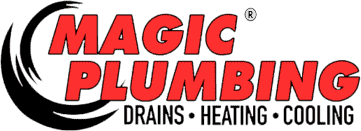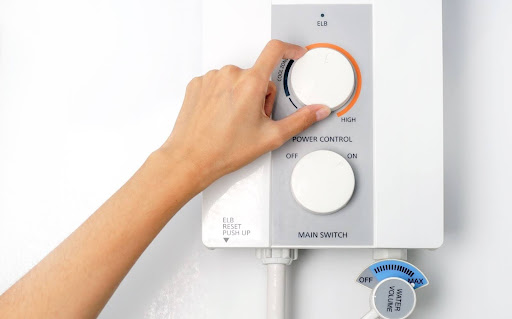When it comes to heating water at home, there are two main contenders in the plumbing world: the reliable traditional water heater with a storage tank and the sleek, modern tankless system. Both serve the same purpose, delivering hot water to your taps, but they go about it in very different ways.
If you’re thinking about replacing your current water heater or upgrading during a home improvement project, choosing the right system can have a big impact on your comfort, utility costs, and energy consumption over time. At Magic Plumbing, we help homeowners across the region find the perfect fit for their needs, budget, and lifestyle.
Let’s walk through what makes these two types of water heaters different and how to decide which one belongs in your home.
Understanding Traditional Water Heaters
Traditional water heaters, also called storage water heaters, are what most people are familiar with. These systems rely on a large tank that typically holds 30 to 80 gallons of water to keep hot water on standby for whenever you need it.
That means when you hop in the shower, run your washing machine, or turn on the kitchen tap, there’s a full reservoir of heated water ready to go. The unit keeps the water hot 24/7 using either a gas-powered combustion chamber or an electric heating element controlled by a thermostat.
The benefit? They’re simple to install, usually more affordable up front, and easy to maintain. But there are drawbacks, too. Once that hot water is used up, you’ll need to wait for the tank to refill and reheat. These systems also lose energy due to heat escaping from the tank, known as standby loss, which means higher fuel or electricity bills over time.
Mineral buildup and sediment can also form at the bottom of the tank, especially in homes with hard water, which reduces efficiency and can eventually lead to corrosion or leaks. That’s why regular maintenance, such as flushing the tank and inspecting the anode rod, is essential to extend its life.
Exploring Tankless Water Heaters
Tankless water heaters take a different approach. Instead of storing hot water in a tank, these systems heat water on demand. When you turn on a faucet, cold water travels through a heat exchanger that kicks in only when needed.
Since there’s no storage tank, you’ll never “run out” of hot water — a major perk for families with busy mornings or multiple bathrooms. Tankless systems also tend to last longer than traditional models and are generally more efficient since they eliminate standby energy loss.
That said, installation can be more complex, especially if your home’s plumbing or electrical system wasn’t designed with tankless in mind. You might need to upgrade pipes, valves, or even your electrical panel, which can increase upfront costs. Also, if you have several appliances or showers running at once, a single tankless unit might struggle to keep up with the demand unless it’s sized properly.
Still, for homeowners interested in reducing their carbon footprint, cutting utility bills, and freeing up space, tankless systems are a smart, environmentally friendly choice.
Which One Is Right For Your Home?
Deciding between a tankless and traditional water heater really comes down to your home’s specific needs, how you use water, and your long-term goals.
If you’re working with a tighter budget or need a quick replacement, a traditional storage water heater might be the more practical choice. It’s straightforward to install and can usually meet the needs of a busy household, especially one with multiple people using water at the same time in the kitchen, laundry room, and bathroom.
On the other hand, if you’re planning a remodel or new build, or simply want to improve your home’s energy efficiency, a tankless system could be the better investment. It takes up less space, uses less energy, and provides an endless stream of hot water when sized correctly. And in regions where energy costs are high, the savings can add up significantly over time.
You’ll also want to factor in maintenance and durability. Both types of systems need periodic care, but tankless units can be especially sensitive to hard water minerals. Installing a filtration system or scheduling regular descaling can help extend the life of your tankless heater and protect the heat exchanger from damage. Traditional tanks, meanwhile, should be flushed annually to prevent sediment buildup that can cause pressure issues or even premature failure.
Our Take: Let a Pro Help You Decide
At the end of the day, there’s no one-size-fits-all answer to the tankless vs. traditional debate. It depends on how much water your household uses, how much you’re willing to invest upfront, and how comfortable you are with the installation process.
What matters most is choosing a solution that works with your space, your water supply setup, and your long-term expectations for efficiency and longevity. And that’s where we come in.
Magic Plumbing is here to help you weigh your options and walk you through the pros and cons based on your home and lifestyle. Our licensed plumbers can evaluate your current system, determine whether a tankless or storage option is best, and handle the entire installation with care and professionalism. We’ll even help you understand how your choice will impact your utility expenses, fuel consumption, and overall home efficiency.
Upgrade Your Water Heater with Magic Plumbing
Choosing between a tankless or traditional water heater can feel like a big decision, but it doesn’t have to be overwhelming. When you have the right information and the right team behind you, you’ll feel confident that your plumbing system is built to support your daily comfort and long-term savings.
Whether you want to enjoy a longer shower without running out of hot water, lower your monthly energy consumption, or make your home more environmentally friendly, we can help you make a smart choice that fits your goals.
Not sure where to start? Reach out to Magic Plumbing today for expert guidance and reliable installation. Let’s find the perfect water heating solution for your home.

